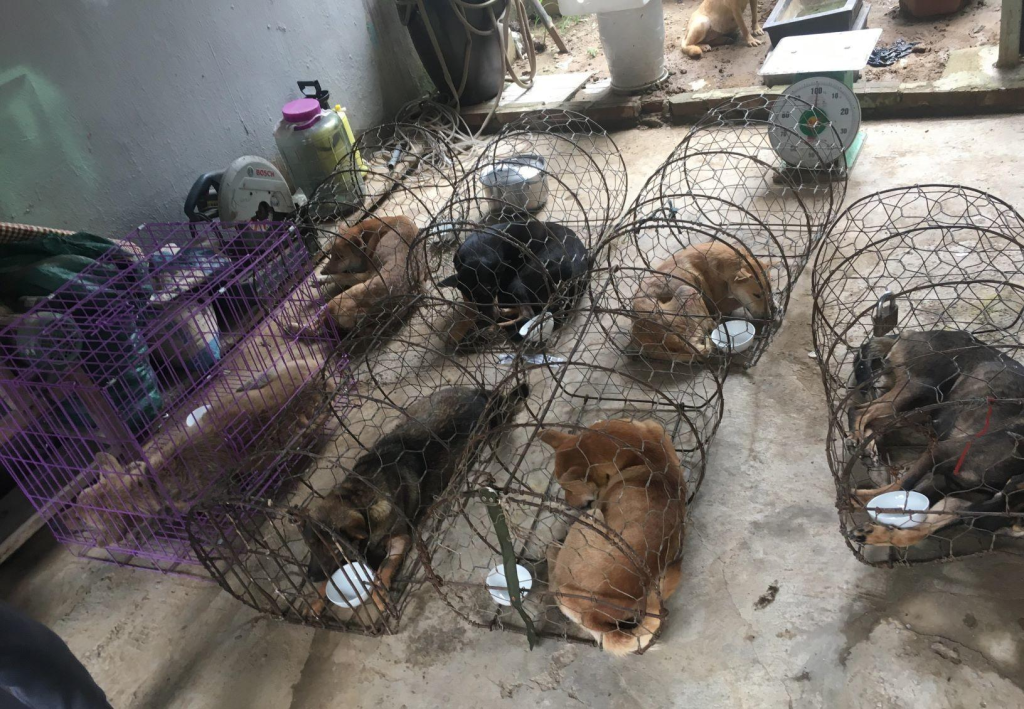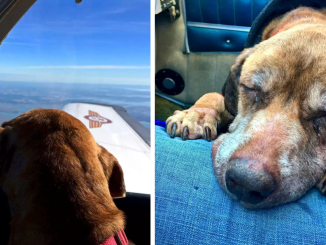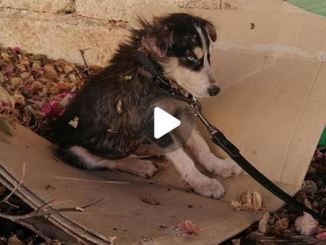
Dr. Katherine Polak, Head of Stray Animal Care Southeast Asia for FOUR PAWS
The dog meat trade is big business in Vietnam and threatens the lives of millions of dogs every year, many of them pets. Every day, pets are violently snatched off the streets, from yards, and even while out on a walk with their owners. These unlucky dogs make a brutal journey to slaughterhouses, markets, and restaurants, where a gruesome death awaits them. But times are changing, and the brutality and illegality of pet theft is no longer being tolerated by Vietnamese authorities.
In a landmark case, police in Thanh Hoa Province received a tip off regarding a gang of dog thieves believed to have stolen thousands of dogs since the beginning of the year. On September 15, 2019 the police successfully carried out the largest ever bust of a dog theft ring in Vietnam, resulting in the seizure of 51 dogs. According to the police, the gang carried stun guns and other sharp weapons, and rode motorbikes through residential areas late at night shooting dogs roaming outside. Police arrested a total of 16 suspected gang members and questioned more than 40 suspects. The gang not only brutalized neighborhood dogs, but also caused outrage among local people, particularly pet owners.
Following the interception, Police struggled to properly care for the confiscated dogs given their limited capacity for animal care, so the Asia Canine Protection Alliance (ACPA), of which FOUR PAWS is a member, stepped in to offer assistance. There were 13 dogs in need of immediate medical care due to severe wounds sustained during capture. Dogs with painful open wounds were anaesthetised, treated, provided pain medication and antibiotics, and housed in a temporary shelter for ongoing treatment.
The Asia Canine Protection Alliance is an international alliance of four animal protection organizations committed to ending the illegal trade of dogs in Vietnam: FOUR PAWS, Animals Asia, Humane Society International, and Change for Animals Foundation. ACPA is working to build collaborative relationships with the governments throughout Southeast Asia where the dog meat trade is prevalent, and has already secured a moratorium on the trade in dogs between Thailand and Vietnam.
Following the confiscation, the police publicised the bust throughout the province using local media so that stolen dogs could be reunited with their families.
Over the course of 2 weeks, all 51 dogs were successful reunited with their owners, who were devastated by their pets’ disappearance.
This bust pets a major precedent as dog theft is rarely treated as a criminal offense in Vietnam unless the canines are valued at more than VND2 million ($86).
“These arrests will hopefully go a long way in deterring future dog theft in Thanh Hoa Province, and potentially throughout all of Vietnam. While the dog meat trade is often defended as ‘culture’ or ‘tradition’, the reality is that there are significant health and societal impacts associated with the trade and these are becoming of ever-growing concern within Vietnam and internationally.”

Earlier in the week, the Food Safety Management Board of Ho Chi Minh City urged locals to stop eating dog meat in an effort to improve Vietnam’s national image with tourists. They also warned the local community of the health risks posed by consuming the unregulated meat. This followed a similar call by the Hanoi People’s Committee last year.
In addition to membership in ACPA, FOUR PAWS also runs a ‘Cats Matter Too program‘ in Central Vietnam with local charities PAWS for Compassion and Vietnam Cat Welfare to improve veterinary training, animal welfare education, and provide free spay/neuter services.
Embark on a mission to rescue the dog afflicted by ear parasites, a condition that has tragically resulted in the loss of his hearing.
The two-year-old dog became lethargic, thin and listless, deteriorating to the point that it was admitted to a pet hospital for a week for a blood transfusion.
“I was really worried about him,” Ms Powell, an enrolled nurse, said.
Testing confirmed Leo had ehrlichiosis, a disease transmitted through bites from brown dog ticks carrying the Ehrlichia canis bacteria.
But what worried the specialists is that Leo lives in the urban Top End, which some experts fear is becoming a new stronghold for a disease spreading like wildfire.
The first Australian case was detected in the Kimberley region of Western Australia in May last year.
By June, cases were rapidly emerging in Katherine in the Northern Territory and the surrounding remote communities.
The Northern Territory government has recorded 370 confirmed cases — 110 in the Darwin and Arnhem Land region, 149 in the Katherine region, 36 in Tennant Creek and in Alice Springs and surrounds, 75.
Experts say countless more have been left undetected in remote communities with little intervention.
“When we finally got to bring him home, [the vets] said he needs to stay inside, he’s at risk of spontaneous bleeding and he might not make it,” Ms Powell said.
“It was very full-on, very emotional.
“There were tears basically every night.”
Until the first cases were discovered just last year, stringent biosecurity controls had kept ehrlichiosis out of Australia.
Experts are still baffled by how the disease got in but, according to Professor Peter Irwin from the School of Veterinary Medicine at Murdoch University, the disease is now considered “endemic” across the NT.
“Ehrlichiosis is one of the most serious diseases of dogs in my opinion,” he said.
“It makes them very ill, and many dogs can die.
“Once it establishes into a tick population, it’s very difficult to eradicate.”

Common symptoms include lethargy, fever and cloudy eyes, which can be cleared up with antibiotics but, if left untreated, the disease can lead to blindness, uncontrollable bleeding and death.
“The problem with this disease is that dogs travel and spread infected ticks,” Professor Irwin said.
“Dogs that have moved from an endemic area of the community into the city will possibly bring ticks with them, and the ticks can then drop off.
“There have now been dogs with the disease identified in most other capitals, most as a result of travel from the north.”
Doctor Stephen Cutter, the head veterinarian at Darwin’s Ark Animal Hospital, is no stranger to the crippling disease.
He said up to 40 per cent of the dogs are infected in the remote communities of the Top End he visits on rotation.
But in August of last year, he saw his first case in a pet that had not left urban Darwin.
Arielle Giles, a vet at the Darwin Veterinary Hospital, confirmed the disease’s spread to Darwin, saying she had seen six cases in the past three months.
“It’s a devastatingly bad disease and it’s really difficult to treat,” Dr Cutter said.
“It’s basically everywhere and it’s now a matter of living with it.”
Both Professor Irwin and Dr Cutter said keeping ticks at bay is the best way to prevent ehrlichiosis.
“Because the infection is transmitted so quickly from the tick bites, the most important way of protecting your dog is to use a product, such as a collar that kills ticks before they bite,” Professor Irwin said.
It has now been five months since Leo was struck down by the tiny parasite and, while he is still getting regular check-ups and his future is looking brighter, vets can’t give the all-clear.
“Ehrlichiosis is really nasty in that it can stay hidden in the bone marrow for a long period of time,” Dr Cutter said.
Earlier this year, the NT government brought on a new coordinator to transition the NT’s response to the disease from a biosecurity threat to managing the outbreak.
“This disease is a nationally notifiable disease, which means that suspected cases of E.canis need to be reported, and free testing can be carried out on blood samples from suspected dogs,” said the chief vet at the Department of Industry, Tourism and Trade, Dr Sue Fitzpatrick.



Leave a Reply